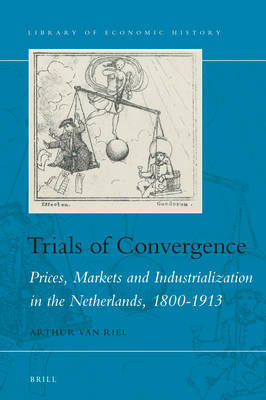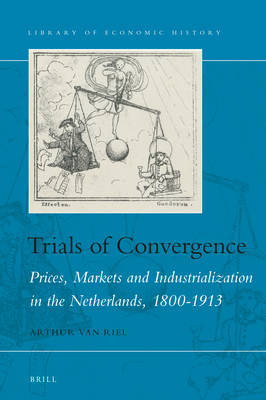
- Afhalen na 1 uur in een winkel met voorraad
- Gratis thuislevering in België vanaf € 30
- Ruim aanbod met 7 miljoen producten
- Afhalen na 1 uur in een winkel met voorraad
- Gratis thuislevering in België vanaf € 30
- Ruim aanbod met 7 miljoen producten
Zoeken
Trials of Convergence
Prices, Markets and Industrialization in the Netherlands, 1800-1913
Arthur Van Riel
€ 200,70
+ 401 punten
Omschrijving
For over a century now, historians have debated the causes of the lagged industrialization of the Dutch economy during the nineteenth century. To this debate, Trials of Convergence brings the analytical perspective of prices, factor costs and the functioning of markets. Its critical insight is that only an approach based on the integrated incentive structure of the economy allows us to delimit the role of alternative explanations. Using statistical reconstruction and microdata, it shows that the retarded transition resulted from a confluence of forces. These ranged from open economy effects and natural endowments to the resilient influence of the institutions of the former Dutch Republic and the fiscal policy adopted in response to Belgian secession. At the height of the British Industrial Revolution the Dutch economy slowed, triggering a return to the problems of eighteenth-century stagnation. All this meant that the transition to 'modern economic growth' after 1860 came about only in a changed international context and after a period of politico-economic reform.
Specificaties
Betrokkenen
- Auteur(s):
- Uitgeverij:
Inhoud
- Aantal bladzijden:
- 644
- Taal:
- Engels
- Reeks:
- Reeksnummer:
- nr. 14
Eigenschappen
- Productcode (EAN):
- 9789004460799
- Verschijningsdatum:
- 24/06/2021
- Uitvoering:
- Hardcover
- Formaat:
- Genaaid
- Afmetingen:
- 155 mm x 235 mm
- Gewicht:
- 1192 g

Alleen bij Standaard Boekhandel
+ 401 punten op je klantenkaart van Standaard Boekhandel
Beoordelingen
We publiceren alleen reviews die voldoen aan de voorwaarden voor reviews. Bekijk onze voorwaarden voor reviews.











